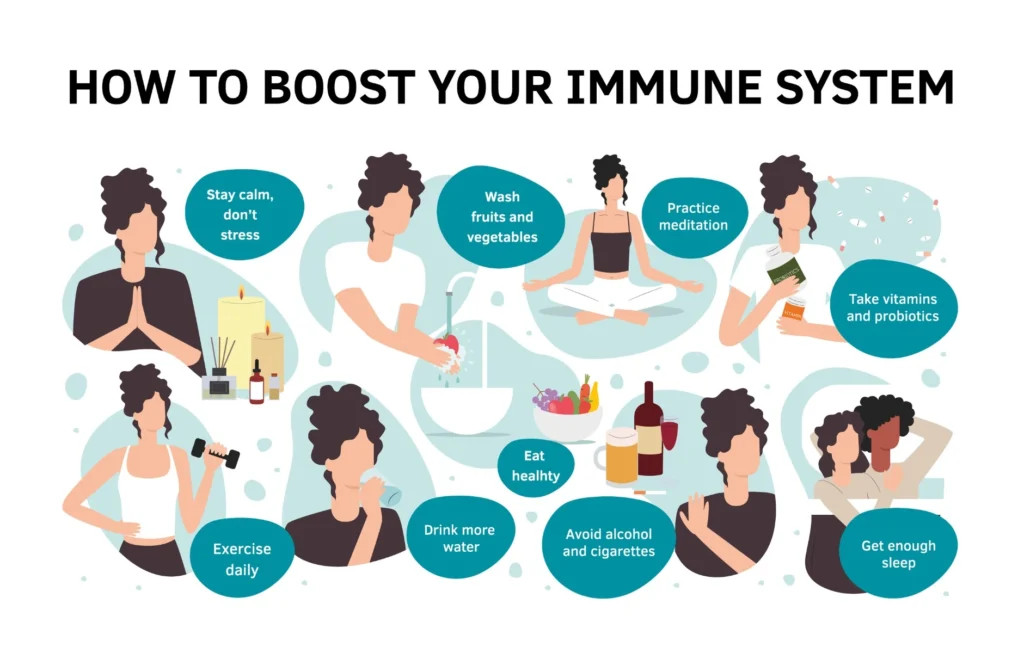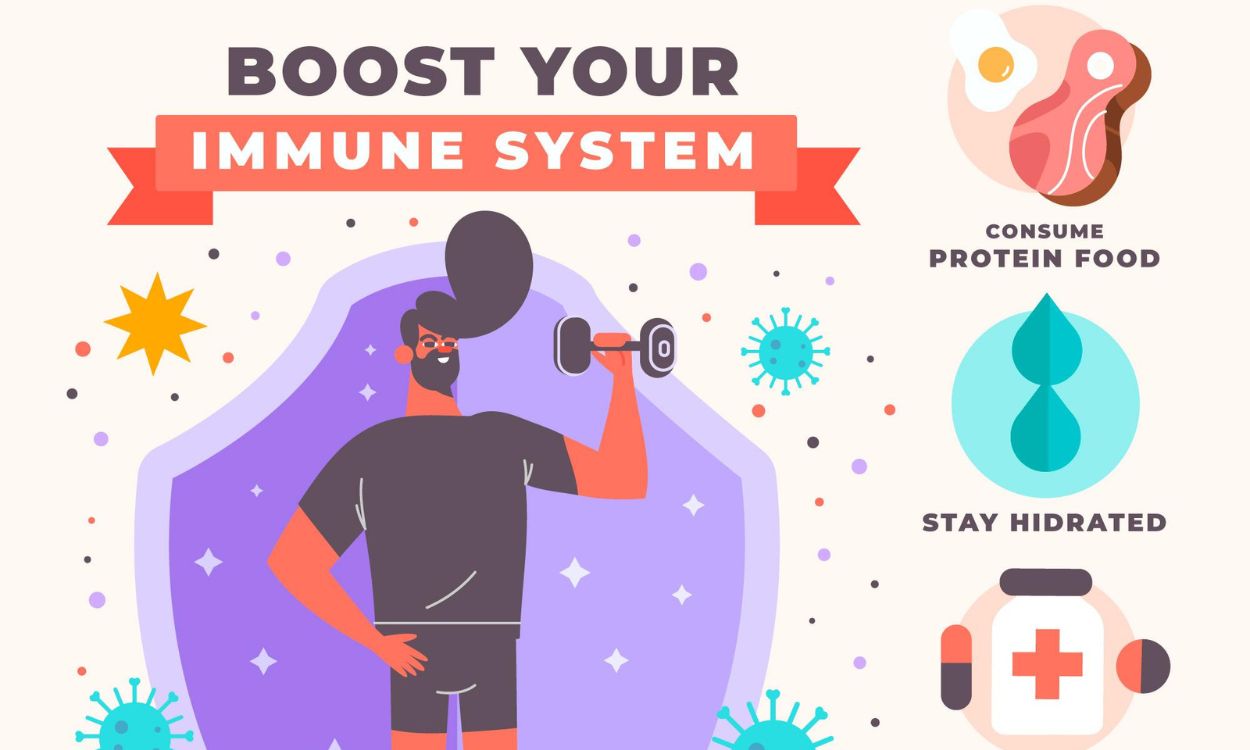Discover the essential tips for building a robust immune system. Learning nutrition, exercise, sleep, hydration, and stress management can help you stay healthy and resilient.
Introduction to Immune Health
Maintaining a strong immune system is crucial for protecting against infections and diseases. The immune system acts as the body’s defense mechanism, fighting off pathogens and supporting overall health. Importantly, a well-functioning immune system is not just about avoiding illness; it’s about maintaining vitality and well-being throughout life. By focusing on lifestyle factors such as nutrition, exercise, sleep, hydration, and stress management, individuals can significantly enhance their immune function.
This comprehensive guide will explore the key strategies for boosting immunity, providing actionable tips and insights to help you build a resilient immune system.
The Foundation of Immunity: Nutrition
A nutritious diet is the cornerstone of immune health. It provides the essential vitamins, minerals, and antioxidants needed to support immune cell function. To begin with, focus on a diverse, whole-foods diet rich in fruits, vegetables, whole grains, lean proteins, and healthy fats.
Key Nutrients for Immunity:
- Vitamin C: Found in citrus fruits and leafy greens, it supports white blood cell production and fights off infections.
- Vitamin D: Crucial for immune regulation, obtained through sun exposure, fatty fish, and fortified foods.
- Zinc: Essential for immune cell development, found in shellfish, lean meats, legumes, and nuts.
- Selenium: Acts as an antioxidant, supporting immune function, and is found in Brazil nuts and fish.
Practical Dietary Tips:
- Eat a Rainbow: Incorporate a variety of colorful fruits and vegetables to ensure a broad range of nutrients.
- Choose Whole Grains: opt for whole grains over refined grains for their fiber and immune-boosting nutrients.
- Incorporate Lean Proteins: Include lean proteins like poultry, fish, beans, and lentils to support immune cell production.

Exercise: A Balanced Approach to Immune Strength
Physical activity is not just about maintaining fitness; it plays a direct role in enhancing immune response. Moreover, exercise helps mobilize immune cells, improving their efficiency in detecting and reacting to infections.
Benefits of Exercise for Immunity:
- Improved Circulation: Enhances the transport of immune cells throughout the body.
- Stress Reduction: Regular exercise can reduce stress levels, which is beneficial for immune function.
- Weight Management: Helps maintain a healthy weight, reducing the risk of obesity-related immune issues.
Practical Exercise Tips:
- Find Enjoyable Activities: Engage in physical activities you enjoy to ensure consistency.
- Balance Intensity: Avoid overexertion, which can be counterproductive to immune health.
- Aim for Moderate Exercise: Incorporate at least 30 minutes of moderate-intensity exercise most days of the week.
Sleep: Essential for Immune Function
Quality sleep is vital for immune health, allowing the body to repair and regenerate. Notably, during sleep, the body produces cytokines, proteins that are crucial for fighting infection and inflammation.
Sleep Strategies for Immunity:
- Establish a Routine: Aim for 7-9 hours of sleep each night and maintain a consistent sleep schedule.
- Optimize Your Sleep Environment: Keep your bedroom cool, dark, and quiet to enhance sleep quality.
- Relaxation Techniques: Use routines like reading or meditation before bed to promote relaxation.
Hydration: The Unsung Hero of Immune Health
Proper hydration is essential for all bodily functions, including immune health. Water helps flush out toxins and ensures efficient transport of nutrients and immune cells throughout the body. For instance, staying hydrated can prevent dehydration, which can impair immune function.
Hydration Tips:
- Drink Regularly: Aim for at least eight glasses of water per day.
- Monitor Urine Output: If your urine is pale yellow or clear, you are likely well-hydrated.
- Incorporate Hydrating Foods: Eat foods with high water content like watermelon and cucumbers.

Stress Management: Protecting Your Immune System
Chronic stress can weaken the immune system by suppressing its ability to fight off infections. Moreover, stress management techniques can help reduce stress hormones and support immune function.
Stress Reduction Strategies:
- Mindfulness and Meditation: Practice mindfulness or meditation to calm the mind and reduce stress.
- Exercise: Regular physical activity is a natural stress reliever.
- Yoga and Deep Breathing: Engage in yoga or deep breathing exercises to promote relaxation.
- Nature Therapy: Spend time in nature to reduce stress and boost mood.
Emerging Trends in Immune Health
Furthermore, ongoing research highlights the importance of personalized nutrition and lifestyle interventions for immune health. Notably, advances in technology are enabling more precise monitoring of immune function and tailored health advice.
Future Directions:
- Personalized Immune Plans: Tailoring immune support based on individual genetic profiles and lifestyle factors.
- Immune-Boosting Supplements: Exploring the role of supplements like vitamin D and zinc in supporting immune function.
Adapting Immune Strategies to Your Lifestyle
Immune health strategies can be adapted to fit different lifestyles and needs:
- For Busy Professionals: Incorporate quick stress-reduction techniques like deep breathing into your daily routine.
- For Athletes: Focus on adequate hydration and nutrition to support immune function during intense physical activity.
- For Older Adults: Prioritize consistent sleep schedules and maintain a balanced diet to support immune health.
Additional Strategies for Building Immunity
Integrative Therapies
Moreover, integrative therapies such as probiotics and herbal supplements may offer additional benefits for immune health. Notably, while these therapies are not a replacement for conventional immune advice, they can complement traditional methods when used under professional guidance.
Educational Resources
Furthermore, accessing educational resources is crucial for staying informed about immune health. Websites from reputable health organizations and immune support groups can provide valuable information and support. In addition, attending workshops or seminars on immunity can offer practical tips and insights from experts.
Community Engagement
Importantly, engaging in the community can provide emotional support and practical advice. Joining local immune support groups or participating in online forums can connect individuals with others who share similar experiences. Moreover, this sense of community can enhance overall well-being and provide a network of support during challenging times.
Conclusion: Building Strong Immunity for Better Health
Building strong immunity is not just about avoiding illness; it’s about maintaining overall health and resilience. By focusing on nutrition, exercise, sleep, hydration, and stress management, individuals can significantly enhance their immune function and reduce the risk of infections.
Ultimately, prioritizing immune health is a proactive step towards living a healthier, more balanced life.

Immunity and Nutrition: A Balanced Approach
Maintaining a balanced diet that includes immune-boosting foods can enhance overall immune function. For example, foods like garlic and ginger have antimicrobial properties that support immune health.
Immune-Boosting Foods:
- Garlic: Contains compounds that have antimicrobial effects.
- Ginger: Acts as an anti-inflammatory and supports immune function.
- Sweet Potatoes: Rich in vitamin A, which supports immune cell production.
Nutritional Tips:
- Eat Fermented Foods: Include fermented foods like yogurt and kimchi for their probiotic benefits.
- Choose Omega-3 Rich Foods: Fatty fish like salmon support immune function with omega-3 fatty acids.
- Incorporate Mushrooms: Certain mushrooms like reishi and shiitake have immune-boosting properties.
Conclusion: Embracing Immune Health as a Lifestyle
Immune health is not just a goal; it’s a lifestyle choice that impacts every aspect of well-being. By prioritizing nutrition, exercise, sleep, hydration, and stress management, individuals can experience significant improvements in immune function and overall health.
Ultimately, building strong immunity is a proactive step towards a healthier, more resilient life.

